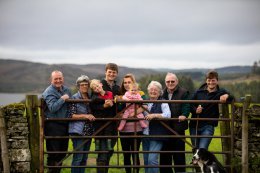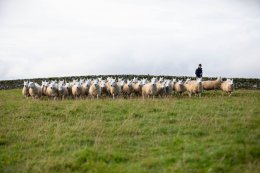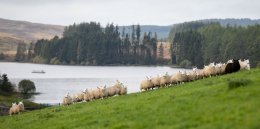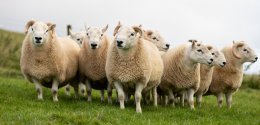
Easter Alemoor
The Anderson family, Syd, Gill. Oliver, Ross, Kirsty, Carys, Madge, Bill & Scott

THERE is no doubt hill farming is a challenging business when faced with poor weather and increased costs, however, breeding a productive and hardy hill sheep is fundamental in any upland system – the Andersons believe they have found the ideal in the South Country Cheviot.
Second-generation farmer,Syd Anderson, has had yearsof experience in workingwith a variety of differentbreeds, including the Southie,having grown up on thetenant farm at Woodburn,Hawick, alongside hisparents, Bill and Madge.
In 1964, the family tookon the tenancy of theneighbouring Parkhill,before then taking on thelease at Easter Alemoor, in1990, where Syd and wife,Gill, currently reside.
This totals some 2500acres split over the threeunits, located in the rollinghills surrounding Hawick,now managed with the helpof their two sons, Ross andScott.
A third son, Neil, whoworks as a farrier, alsoreturns home in between hiswork, to help out during thebusiest times of the farmingcalendar.
Well-known for producingtop quality store and breedingstock, the Andersons sellthrough their local market atLongtown and at Harrisonand Hetherington’s annualram sale, at Lockerbie Mart.
Out with the pure-bredflock of 1100 South Country Cheviots, which come under the well-known Alemoorprefix, the farm is also hometo flocks of 500Blackface ewes, 15 BluefacedLeicesters and a number ofSuffolks, with only a selectnumber of tups being boughtin as necessary . Some 300 ofthe pure-bred Cheviots arecrossed with a BluefacedLeicester tup to producethe increasingly popularreplacement in-bye female,the Cheviot Mule.
Draft ewes heading for Longtown

With so many breeds andcrosses, it is, nevertheless,the Southie that is key to theoverall profitability of thishill farming enterprise.
“The South CountryCheviot is a breed full ofcharacter and the sheep have a real spark about them, which is what I love to see in any breed,” said Syd.
“They are also very hardy and easy kept, being a low cost all round female breed. Southie ewes are able to make the best of the poorest grazing and roughage on the hill, whilst still being able to thrive and produce top quality lambs,” he commented.
“The hill ewes are producing average scanning percentages of 110% each year, and they can be left to their own devices to successfully lamb without assistance. As a breed, the Cheviot makes for an amazing mother, she’s very milky, as well as easy lambed with few, if any, feed inputs necessary. The Cheviot certainly does the business for us,” said Syd.
The family is equally impressed by the breed’s cross-bred progeny in the Cheviot Mule too. As it is, the Cheviots crossed to the Bluefaced Leicester produce scanning percentages of 140%.
Ross, who lives at Parkhill with his wife, Kirsty, and two children, Oliver (3) and seven-month-old Carys, added: “Crossing the Cheviot with the Bluefaced Leicester makes for an all-round productive commercial breeding female. The Cheviot Mule has all the positive attributes from the Cheviot dam when it comes to rearing lambs and carcase conformation, as well as obtaining the increased prolificacy and increased lamb size from the Leicester sire. Crossed to a Suffolk they tend to produce scanning percentages of 190%.”
Click to edit textEwe Lambs in front of the stunning backdrop at Easter Alemoor

Most years, the Anderson’s run 450 Cheviot Mule ewes and 130 hoggs as replacement stock, to cross to Suffolk tups.
“The Suffolk cross lambs have great carcases and shape, and are more suited to the lowland ground that we have, which means we can get them away by November at the latest, at store or fat and also for breeding purposes.” said Scott.
“On average our Suffolk cross Cheviot Mule ewe lambs will average around £85 per head, sold privately, while the remainder of the Suffolk crosses are sold deadweight to average £75.”
By concentrating on breeding the best of commercial stock, Syd and his family have built up a good reputation at local markets too, which helps draw in the buyers, with the result, their Cheviot store lambs also attract premium prices.
In a typical year, their top draw lambs achieve around £55-£60 per head, all of which are reared on grass, whilst the rest of the lambs are kept for fattening, and, on average, sell for £80.
Most of their stock rams are home-bred too, however they do purchase the odd one when required and they are very selective when looking for future sires.
“We only buy in tups that we think will make a positive stamp on the flock. They need to have excellent conformation, good skin, clean white hair and a bit of a spark about them. I like a tup with a bold character.”
Syd added that two specific tups have made their mark on the flock in previous years, with the first being Skelfhill Favourite, purchased for £1800 at Lockerbie. The second was Crossdykes Ivanhoe, a tup bought at £900 at the same centre which was a grandfather to the Anderson’s Alemoor Rolex – the £4400 lead priced ram from the flock sold at last year’s Lockerbie sale to Sandy and William Fleming, at Hislop, Hawick.
“We have kept sons off both tups, as they help produce a stamp and a uniformity throughout the flock to help create our own style of sheep. We are very selective with our own stock, keeping only the best of the bunch to improve our flock.”
A selection of the SCC tups

The family also support their local shows, Teviothead and Roberton, where they have achieved noted success in the past and this year saw them win a first prize with a Cheviot tup lamb, as well as receiving the Sam Barker Perpetual Challenge Cup for Cheviot ewe and own ewe lamb, at Teviothead.
As well as managing the large sheep enterprise and three units, the Anderson’s also run a closed herd of 100 suckler cattle, comprised of mainly Limousin and Simmental, which are sold as yearlings at St Boswells with the best of the heifers retained for replacements.
Touching on the uncertain future that agriculture faces, in regards to Brexit, Syd concluded: “Brexit is a big worry, not just for ourselves but for the industry as a whole, with uncertainty around prices and a market for our product being of huge concern. However, we are positive when we see the popularity of the South Country Cheviot increasing, which in turn, helps secure its future within the breeding sheep world.”
The South Country Cheviot breed will always remain a force to be reckoned with for many. It certainly has a long future ahead of it at Easter Alemoor.
This year, the family has eight rams entered for the South Country Cheviot breed sale at Lockerbie on Monday, October 7th.
(By the kind permission of the Scottish Farmer)
